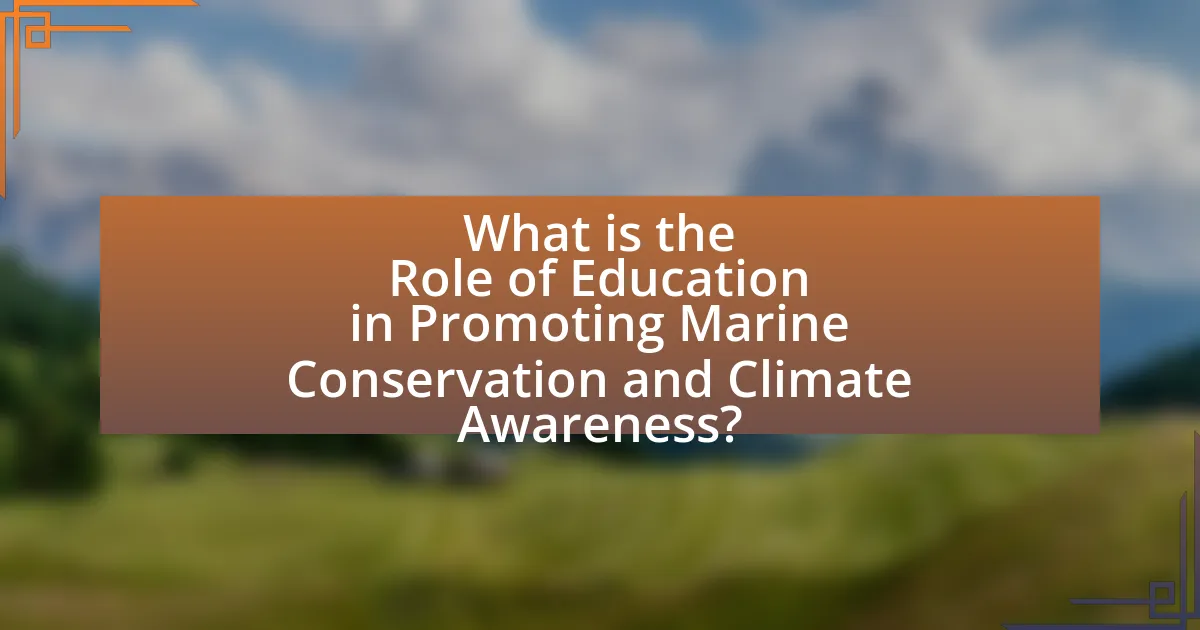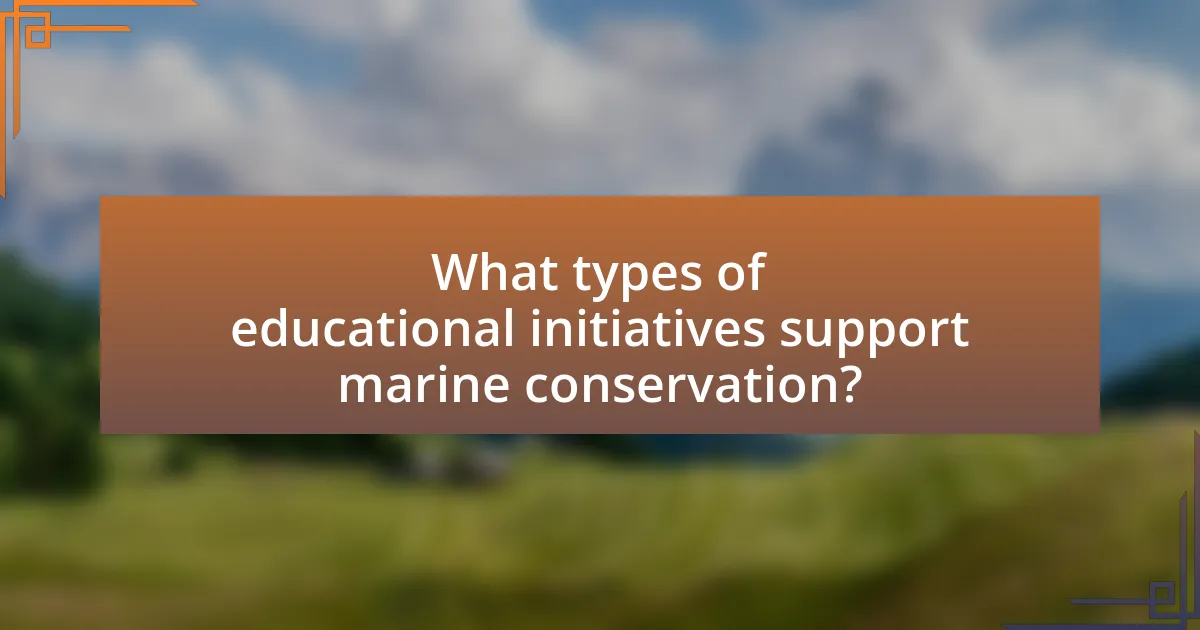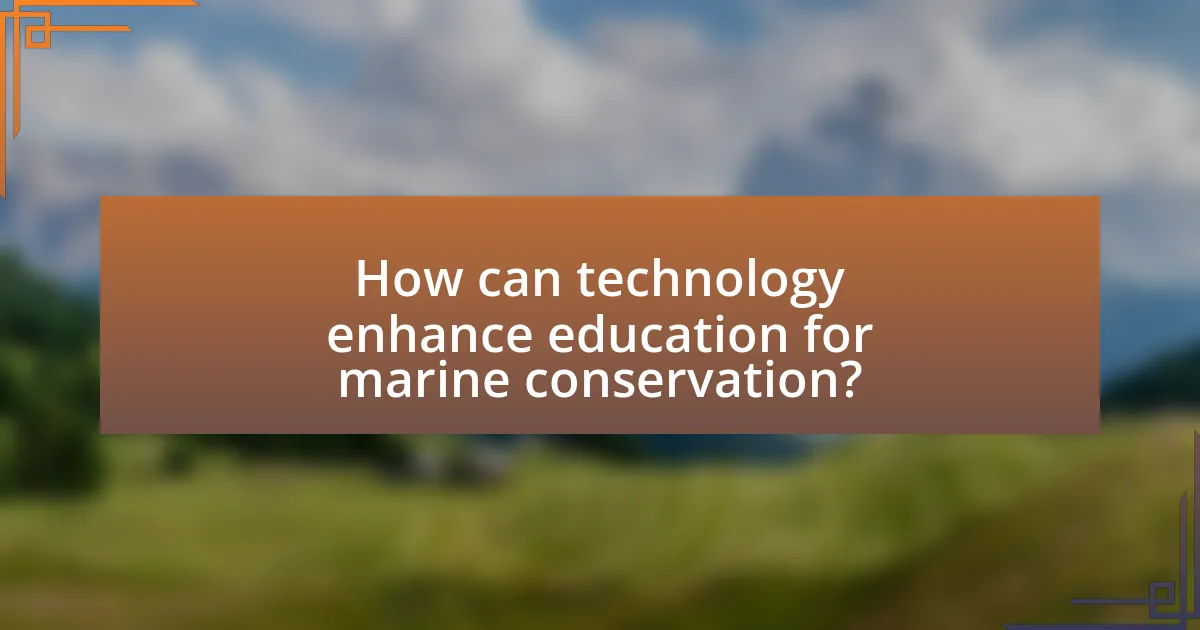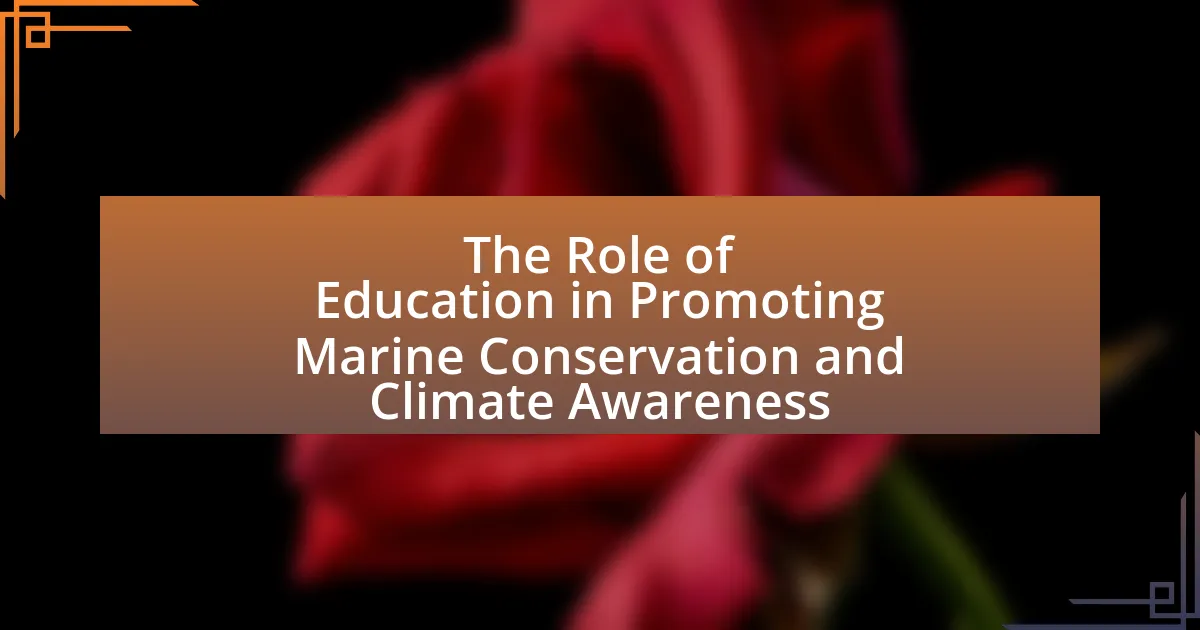Education is a vital component in promoting marine conservation and climate awareness, providing individuals with the necessary knowledge and skills to tackle environmental challenges. The article explores how educational initiatives, including community workshops and school curricula, enhance public understanding of marine ecosystems and the impacts of climate change, leading to increased support for conservation efforts. It highlights key strategies such as experiential learning and community engagement, and discusses the role of formal and non-formal education in fostering a conservation-minded society. Additionally, the article examines the effectiveness of technology and social media in raising awareness and engaging communities in marine conservation activities.

What is the Role of Education in Promoting Marine Conservation and Climate Awareness?
Education plays a crucial role in promoting marine conservation and climate awareness by equipping individuals with the knowledge and skills necessary to understand and address environmental challenges. Through formal and informal educational programs, people learn about marine ecosystems, the impact of climate change, and the importance of sustainable practices. For instance, studies show that educational initiatives, such as community workshops and school curricula focused on marine biology, significantly increase awareness and engagement in conservation efforts. Research conducted by the National Oceanic and Atmospheric Administration (NOAA) indicates that students who participate in marine education programs demonstrate a greater commitment to environmental stewardship, highlighting the effectiveness of education in fostering a conservation-minded society.
How does education influence public perception of marine conservation?
Education significantly influences public perception of marine conservation by increasing awareness and understanding of marine ecosystems and their importance. When individuals receive education about marine biodiversity, threats such as pollution and climate change, and the benefits of conservation efforts, they are more likely to support and engage in conservation initiatives. Research conducted by the National Oceanic and Atmospheric Administration (NOAA) indicates that educational programs can lead to a 30% increase in public support for marine protected areas. This demonstrates that informed individuals are more likely to advocate for policies that protect marine environments, highlighting the critical role education plays in shaping positive public attitudes toward marine conservation.
What are the key educational strategies used to raise awareness?
Key educational strategies used to raise awareness include experiential learning, community engagement, and interdisciplinary approaches. Experiential learning, such as hands-on activities and field trips, allows individuals to connect with marine environments directly, fostering a deeper understanding of conservation issues. Community engagement involves collaboration with local organizations and stakeholders to create relevant educational programs that resonate with specific audiences, enhancing the impact of awareness efforts. Interdisciplinary approaches integrate knowledge from various fields, such as science, policy, and ethics, to provide a comprehensive understanding of marine conservation and climate change. These strategies have been shown to effectively increase awareness and promote behavioral change, as evidenced by programs like the Ocean Literacy Framework, which emphasizes the importance of understanding ocean systems in fostering stewardship.
How do educational programs impact community engagement in marine conservation?
Educational programs significantly enhance community engagement in marine conservation by increasing awareness and fostering a sense of responsibility among participants. These programs often include hands-on activities, workshops, and outreach initiatives that educate individuals about marine ecosystems and the threats they face. For instance, a study published in the journal “Marine Policy” by researchers from the University of Queensland found that communities involved in educational initiatives demonstrated a 40% increase in participation in local conservation efforts. This evidence illustrates that when individuals are informed about the importance of marine conservation, they are more likely to engage in protective actions, such as participating in clean-up events or advocating for sustainable practices.
Why is marine conservation important in the context of climate change?
Marine conservation is crucial in the context of climate change because healthy marine ecosystems play a significant role in regulating the Earth’s climate. Oceans absorb approximately 30% of carbon dioxide emissions, mitigating the effects of climate change. Furthermore, marine biodiversity contributes to the resilience of ecosystems, enabling them to adapt to changing conditions. For instance, coral reefs, which support diverse marine life, are vital for coastal protection and carbon storage; however, they are severely threatened by rising sea temperatures and ocean acidification. Protecting these ecosystems through marine conservation efforts is essential for maintaining their functions and supporting global climate stability.
What are the effects of climate change on marine ecosystems?
Climate change significantly disrupts marine ecosystems by causing ocean warming, acidification, and sea level rise. Ocean warming leads to coral bleaching, which affects biodiversity and fish populations, as corals provide essential habitats. Acidification, resulting from increased carbon dioxide absorption, impairs shell formation in marine organisms like mollusks and affects food webs. Additionally, rising sea levels contribute to habitat loss in coastal areas, impacting species that rely on these environments. According to the Intergovernmental Panel on Climate Change (IPCC), these changes threaten the stability of marine ecosystems and the livelihoods of communities dependent on them.
How does marine conservation contribute to climate resilience?
Marine conservation contributes to climate resilience by protecting and restoring marine ecosystems, which play a critical role in carbon sequestration and biodiversity maintenance. Healthy marine environments, such as mangroves, seagrasses, and coral reefs, absorb significant amounts of carbon dioxide, thereby mitigating climate change effects. For instance, mangroves can sequester up to four times more carbon per hectare than tropical forests, highlighting their importance in climate regulation. Additionally, diverse marine ecosystems enhance resilience against climate impacts, such as extreme weather events, by providing natural barriers and stabilizing coastlines. This interconnectedness between marine health and climate stability underscores the necessity of marine conservation efforts in fostering a more resilient planet.

What types of educational initiatives support marine conservation?
Educational initiatives that support marine conservation include community outreach programs, school-based curricula, and public awareness campaigns. Community outreach programs engage local populations in conservation efforts, often involving hands-on activities like beach clean-ups and habitat restoration, which foster a sense of stewardship. School-based curricula integrate marine science into educational frameworks, teaching students about marine ecosystems and the importance of conservation from an early age. Public awareness campaigns utilize media and events to inform the general public about marine issues, such as overfishing and pollution, thereby encouraging responsible behaviors. These initiatives collectively enhance knowledge and promote active participation in marine conservation efforts.
How do formal education systems incorporate marine conservation topics?
Formal education systems incorporate marine conservation topics through curriculum integration, experiential learning, and partnerships with environmental organizations. Educational institutions often include marine biology, ecology, and environmental science courses that cover marine ecosystems, biodiversity, and conservation strategies. For instance, the National Science Education Standards emphasize the importance of teaching about ocean ecosystems and their conservation. Additionally, hands-on experiences such as field trips to marine reserves or participation in citizen science projects enhance students’ understanding of marine conservation. Collaborations with organizations like the Ocean Conservancy provide resources and programs that support the teaching of marine conservation in schools, reinforcing the relevance of these topics in real-world contexts.
What subjects are most relevant to marine conservation in school curricula?
The subjects most relevant to marine conservation in school curricula include biology, environmental science, geography, and oceanography. Biology provides foundational knowledge about marine ecosystems and species, while environmental science focuses on the interactions between humans and the marine environment, emphasizing conservation strategies. Geography helps students understand the spatial distribution of marine resources and the impact of human activities on oceans. Oceanography offers insights into ocean processes, currents, and the importance of marine habitats. Together, these subjects equip students with the necessary knowledge and skills to engage in marine conservation efforts effectively.
How can universities contribute to marine conservation education?
Universities can contribute to marine conservation education by integrating marine science into their curricula and promoting research initiatives focused on marine ecosystems. By offering specialized programs in marine biology, environmental science, and sustainability, universities equip students with the knowledge and skills necessary to address marine conservation challenges. For instance, the University of California, Santa Barbara, offers a Marine Science Institute that conducts research on coastal ecosystems and provides educational outreach, demonstrating a commitment to marine conservation. Additionally, universities can engage in community outreach programs that raise awareness about marine issues, fostering a culture of conservation among students and local communities.
What role do non-formal education programs play in marine conservation?
Non-formal education programs play a crucial role in marine conservation by enhancing public awareness and fostering community engagement in environmental stewardship. These programs, which include workshops, community events, and hands-on activities, provide accessible learning opportunities that empower individuals to understand marine ecosystems and the threats they face. For instance, research indicates that participants in non-formal education initiatives are more likely to adopt sustainable practices, such as reducing plastic use and participating in local conservation efforts. This is supported by a study published in the Journal of Environmental Education, which found that community-based marine education programs significantly increased participants’ knowledge and positive attitudes towards marine conservation.
What community-based initiatives exist to promote marine awareness?
Community-based initiatives that promote marine awareness include programs like beach clean-ups, educational workshops, and citizen science projects. These initiatives engage local communities in hands-on activities that foster a deeper understanding of marine ecosystems and the importance of conservation. For example, organizations such as Ocean Conservancy coordinate annual International Coastal Cleanup events, which mobilize thousands of volunteers to remove trash from beaches, thereby raising awareness about marine pollution and its impacts. Additionally, local schools often partner with marine conservation groups to implement educational programs that teach students about marine biodiversity and sustainable practices, reinforcing the significance of protecting marine environments.
How effective are workshops and seminars in educating the public?
Workshops and seminars are highly effective in educating the public, particularly in areas like marine conservation and climate awareness. These interactive formats facilitate direct engagement, allowing participants to ask questions and discuss topics in depth, which enhances understanding and retention of information. Research indicates that experiential learning, such as that found in workshops, leads to a 75% retention rate compared to 5% for traditional lectures (National Training Laboratories). Furthermore, seminars often feature expert speakers who provide current, evidence-based information, making the content relevant and actionable for attendees. This combination of engagement and expert insight significantly boosts the effectiveness of public education initiatives.

How can technology enhance education for marine conservation?
Technology can enhance education for marine conservation by providing interactive learning experiences and access to real-time data. For instance, virtual reality (VR) allows students to explore underwater ecosystems, fostering a deeper understanding of marine biodiversity and conservation challenges. Additionally, online platforms and mobile applications can deliver up-to-date information on marine species and habitats, enabling learners to engage with current conservation efforts. Research indicates that immersive technologies like VR can increase knowledge retention by up to 75%, demonstrating their effectiveness in educational settings. Furthermore, data analytics tools can track student progress and tailor educational content to individual learning needs, making marine conservation education more effective and personalized.
What digital tools are available for marine conservation education?
Digital tools available for marine conservation education include interactive websites, mobile applications, virtual reality experiences, and online courses. Interactive websites like Ocean Conservancy provide resources and information on marine ecosystems, while mobile applications such as Marine Debris Tracker allow users to report and track marine litter. Virtual reality experiences, like those offered by the Ocean Agency, immerse users in underwater environments to raise awareness about coral reefs. Online courses from platforms like Coursera and edX offer structured learning on marine biology and conservation strategies. These tools enhance engagement and understanding of marine conservation issues, supported by research indicating that interactive learning increases retention and awareness among participants.
How do online platforms facilitate awareness and engagement?
Online platforms facilitate awareness and engagement by providing accessible information and interactive features that connect users with marine conservation and climate issues. These platforms, such as social media, educational websites, and online forums, enable organizations to share educational content, host discussions, and mobilize communities around conservation efforts. For instance, studies show that social media campaigns can significantly increase public awareness; a report by the Pew Research Center indicates that 69% of adults in the U.S. use social media, making it a powerful tool for disseminating information and fostering engagement in environmental initiatives.
What role do social media campaigns play in marine conservation education?
Social media campaigns play a crucial role in marine conservation education by effectively raising awareness and engaging the public on marine issues. These campaigns utilize platforms like Facebook, Twitter, and Instagram to disseminate information, share impactful visuals, and mobilize community action, thereby reaching a broad audience. For instance, a study by the Pew Research Center found that 69% of adults in the U.S. use social media, making it an essential tool for educational outreach. Furthermore, campaigns often leverage user-generated content, which fosters a sense of community and personal investment in marine conservation efforts. This interactive approach not only educates individuals about marine ecosystems but also encourages them to participate in conservation activities, demonstrating the significant impact of social media in promoting marine conservation education.
How can educators measure the impact of marine conservation education?
Educators can measure the impact of marine conservation education through pre- and post-program assessments that evaluate changes in knowledge, attitudes, and behaviors regarding marine ecosystems. These assessments can include surveys, quizzes, and practical evaluations that quantify students’ understanding of marine biodiversity and conservation practices. For instance, a study by the National Oceanic and Atmospheric Administration (NOAA) found that students who participated in marine education programs showed a 30% increase in knowledge about local marine species and their habitats. Additionally, tracking student engagement in conservation activities, such as beach clean-ups or community awareness campaigns, provides tangible evidence of behavioral change resulting from educational initiatives.
What metrics are used to assess educational effectiveness in this field?
Metrics used to assess educational effectiveness in marine conservation and climate awareness include knowledge retention, behavioral change, and community engagement. Knowledge retention is measured through pre- and post-assessments that evaluate participants’ understanding of marine ecosystems and climate issues. Behavioral change is assessed by tracking actions taken by individuals or communities, such as increased participation in conservation activities or reduced plastic usage. Community engagement metrics involve the number of participants in educational programs, feedback surveys, and the extent of partnerships formed with local organizations. These metrics provide a comprehensive evaluation of how educational initiatives impact awareness and action regarding marine conservation and climate change.
How can feedback from participants improve educational programs?
Feedback from participants can significantly improve educational programs by providing insights into the effectiveness of content, delivery methods, and overall engagement. When participants share their experiences and suggestions, educators can identify areas that require enhancement, such as curriculum adjustments or teaching strategies. For instance, a study by the National Center for Education Statistics found that programs incorporating participant feedback showed a 20% increase in learner satisfaction and retention rates. This data underscores the importance of participant input in refining educational approaches, ultimately leading to more impactful learning experiences in marine conservation and climate awareness.
What practical steps can individuals take to promote marine conservation through education?
Individuals can promote marine conservation through education by engaging in community outreach programs that focus on marine ecosystems. These programs can include organizing workshops, seminars, and informational sessions that educate the public about the importance of marine biodiversity and the threats it faces, such as pollution and overfishing. Research indicates that educational initiatives can significantly increase awareness and change behaviors; for instance, a study published in the journal “Marine Policy” found that community-based education programs led to a 30% increase in local conservation efforts. Additionally, individuals can utilize social media platforms to share informative content about marine conservation, thereby reaching a broader audience and fostering a culture of environmental stewardship.
